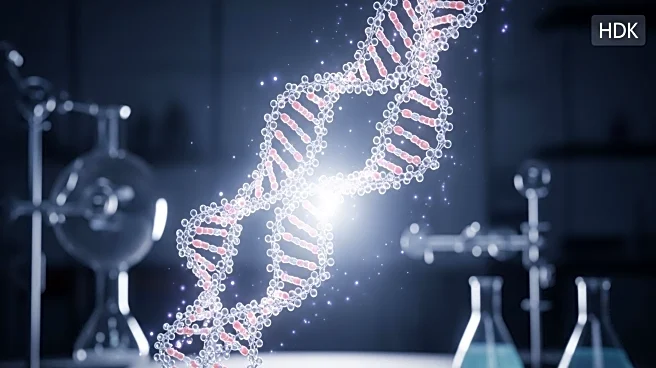What's Happening?
A team of biologists has published a study in the journal Nature, revealing how RNA molecules and amino acids can combine through random interactions to form proteins. This discovery addresses a longstanding question in biology regarding the origin of life. Proteins, essential for cellular functions, are typically created inside cells by ribosomes based on RNA instructions. The study provides a glimpse into how proteins could have formed before these biological factories existed. The researchers used simple chemistry in water at neutral pH to link amino acids to RNA, suggesting that this process could have occurred on early Earth. The study highlights the role of pantetheine, a molecule crucial for metabolism, in facilitating the reaction between amino acids and RNA.
Why It's Important?
This breakthrough offers significant insights into the origin of life, potentially reshaping our understanding of how life's building blocks came together. The ability to form proteins without cellular machinery could explain how early life forms developed, impacting fields such as evolutionary biology and biochemistry. The study suggests that life may have originated in smaller freshwater bodies rather than oceans, challenging existing theories. This discovery could influence future research on life's origins and the search for life beyond Earth, as amino acids and nucleotides have been found on asteroids, indicating that life's ingredients are widespread in the universe.
What's Next?
Further research is needed to understand the implications of this discovery fully. Scientists may explore the conditions under which these reactions occur and their potential to replicate the process in laboratory settings. The study opens avenues for investigating the role of pantetheine and similar molecules in early Earth environments. Researchers might also examine the possibility of similar processes occurring on other planets, contributing to astrobiology and the search for extraterrestrial life. The findings could lead to advancements in synthetic biology, where understanding protein formation without cellular machinery could have practical applications.
Beyond the Headlines
The study raises ethical and philosophical questions about the nature of life and its origins. Understanding how life could spontaneously arise from simple chemical reactions challenges traditional views on life's complexity and uniqueness. It may prompt discussions on the definition of life and the criteria for identifying life forms in extraterrestrial environments. The research also highlights the interconnectedness of chemistry and biology, emphasizing the importance of interdisciplinary approaches in solving complex scientific problems.











